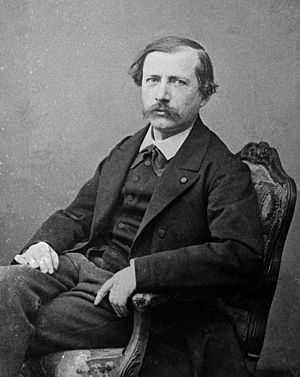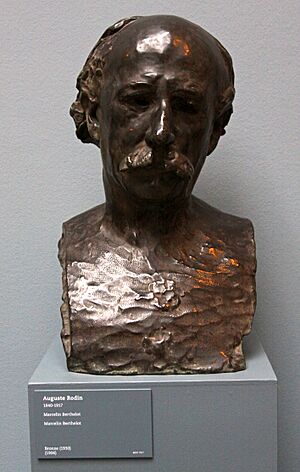Marcellin Berthelot facts for kids
Quick facts for kids
Marcellin Berthelot
FRS FRSE
|
|
|---|---|
 |
|
| Born |
Pierre Eugène Marcellin Berthelot
25 October 1827 |
| Died | 18 March 1907 (aged 79) Paris, French Republic
|
| Known for | Thomsen–Berthelot principle Berthelot's reagent Principle of maximum work |
| Spouse(s) | Sophie Berthelot |
| Children |
|
| Awards |
|
| Scientific career | |
| Fields | Chemistry (thermochemistry) |
| Influences | Antoine Jérôme Balard |
Pierre Eugène Marcellin Berthelot (born October 25, 1827 – died March 18, 1907) was a famous French chemist. He was also a Republican politician. He is best known for his work in thermochemistry, which is the study of heat changes during chemical reactions.
Berthelot made many organic compounds (chemicals found in living things) from inorganic substances (chemicals not from living things). This was a big deal because many scientists at the time believed that organic compounds could only be made by living organisms. His work helped prove this idea wrong.
He believed that by the year 2000, chemical synthesis would change the food industry. He thought that making food in labs would replace farms. He wondered, "Why not, if it was cheaper and better to make the same materials than to grow them?"
Marcellin Berthelot was considered one of the most famous chemists in the world. In 1895, when he became the Minister of Foreign Affairs for France, people called him "the most eminent living chemist" in the country. In 1901, he was chosen as one of the "Forty Immortals" of the Académie française, a very respected French academy. He shared all his discoveries not just with France, but with everyone.
Contents
Early Life and Choices
Marcellin Berthelot was born in Paris, France, on October 25, 1827. His father was a doctor. When he was young, Berthelot did very well in school, especially in history and philosophy.
He decided with his friend, the historian Ernest Renan, not to go to a "grande école." These were special schools where most smart people in France studied. Instead, he chose to become a scientist. He was an atheist, meaning he didn't believe in God. However, his wife, Sophie, who was a Calvinist (a type of Christian), had a big influence on him.
Amazing Discoveries in Chemistry
Berthelot believed that all chemical events happen because of physical forces. He thought these forces could be measured and understood. When he started his career, many scientists thought that organic chemistry was only about taking things apart, not building them. They believed that making organic substances needed a "vital force" from living things.
He strongly disagreed with this idea. He created many organic compounds in his lab. These included hydrocarbons (chemicals made of hydrogen and carbon), natural fats, and sugars. He showed that organic compounds could be made using normal chemical methods. This proved that they follow the same rules as inorganic substances.
His work showed that chemistry could actually create new things based on its theories. This was a special ability that other sciences, like natural history, didn't have at the time. He even had a long debate with Louis Pasteur about this. Pasteur believed in the "vital force" because of his work on how alcohol is made.
Awards and Recognition
Marcellin Berthelot received many honors for his important work. In 1863, he became a member of the Académie Nationale de Médecine. He also received the Grand Cross of the Legion of Honour, which is a very high award in France.
He was elected an honorary member of the American Academy of Arts and Sciences in 1880. In 1881, he became a foreign member of the Royal Netherlands Academy of Arts and Sciences. A street in Lyon, France, was named Avenue Berthelot after him on March 25, 1907, shortly after he passed away.
His Family Life
Marcellin Berthelot died suddenly on March 18, 1907, in Paris. His wife, Sophie Niaudet, had just passed away on the same day. They were buried together in the Panthéon in Paris, a special place where many famous French people are laid to rest.
He and Sophie had six children: Marcel André, Marie-Hélène, Camille, Daniel, Philippe, and René.
In Art
The famous sculptor Auguste Rodin created a bust (a sculpture of the head and shoulders) of Berthelot.
See also
 In Spanish: Marcellin Berthelot para niños
In Spanish: Marcellin Berthelot para niños
- Abiogenic petroleum origin
- Berthelot's reagent
 | William L. Dawson |
 | W. E. B. Du Bois |
 | Harry Belafonte |


